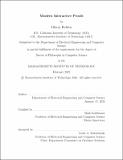| dc.description.abstract | In this thesis, we study several extensions of the concept of interactive proofs. First, we consider non-signaling multi-prover interactive proofs. Interacting with multiple non-interacting provers increases the ability of the verifier to check the solution by asking the provers different questions and checking the consistency of their answers. In a non-signaling multi-prover proof, the provers can interact and correlate their answers, but not in an unlimited way: non-signaling provers must make the distribution of answers for any subset of provers only depend on the distribution of questions the verifier sends to that same subset. Non-signaling proofs, have found applications in cryptography and hardness of approximation. An important open problem is characterizing the power of non-signaling proofs. It is known that 2-prover non-signaling proofs are characterized by PSPACE, and that non- signaling proofs with poly(𝑛)- provers are characterized by EXP. However, the power of 𝑘-prover non-signaling proofs, for 2 < 𝑘 < poly(𝑛) remained an open problem. We show that 𝑘-prover non-signaling proofs (with negligible soundness) for 𝑘 = 𝑂(𝑝 log 𝑛) are contained in PSPACE. We prove this via two different routes that are of independent interest. In both routes we consider a relaxation of non-signaling called sub-non-signaling. Our main technical contribution (which is used in both our proofs) is a reduction showing how to convert any sub-non- signaling strategy with value at least [formula] into a non-signaling one with value at least [formula].
Second, we introduce pseudo-deterministic interactive proofs (psdIP): interactive proof systems for search problems where the verifier is guaranteed with high probability to output the same output on different executions. As in the case with classical interactive proofs, the verifier is a probabilistic polynomial time algorithm interacting with an untrusted powerful prover. We view pseudo-deterministic interactive proofs as an extension of the study of pseudo-deterministic randomized algorithms: the goal of the latter is to find canonical solutions to search problems whereas the goal of the former is to prove that a solution to a search problem is canonical to a probabilistic polynomial time verifier. Alternatively, one may think of the powerful prover as aiding the probabilistic polynomial time verifier to find canonical solutions to search problems, with high probability over the randomness of the verifier. The challenge is that pseudo- determinism should hold not only with respect to the randomness, but also with respect to the prover: a malicious prover should not be able to cause the verifier to output a solution other than the unique canonical one. The IP = PSPACE characterization implies that psdIP = IP. The challenge is to find constant round pseudo-deterministic interactive proofs for hard search prob-lems. We show a constant round pseudo-deterministic interactive proof for the graph isomorphism problem: on any input pair of isomorphic graphs (𝐺₀, 𝐺₁), there exist a unique isomorphism from 𝐺₀ to 𝐺₁ (although many isomorphism many exist) which will be output by the verifier with high probability, regardless of any dishonest prover strategy. In contrast, we show that it is unlikely that psdIP proofs with constant rounds exist for NP-complete problems by showing that if any NP-complete problem has a psdIP protocol, then the polynomial hierarchy collapses.
Third, we define doubly-efficient pseudo-deterministic proofs for polynomial time search problems: pseudo-deterministic proofs with the extra requirement that the prover runtime is polynomial and the verifier runtime to verify that a solution is canonical is significantly lower than the complexity of finding any solution, canonical or otherwise. Naturally this question is particularly interest-ing for search problems for which a lower bound on its worst case complexity is known or has been widely conjectured.
We show doubly-efficient pseudo-deterministic algorithms for a host of natural problems whose complexity has long been conjectured. In particular, linear programming and a variety of problems studied at the center of the fine grained complexity study. | |
